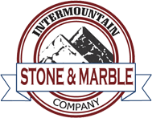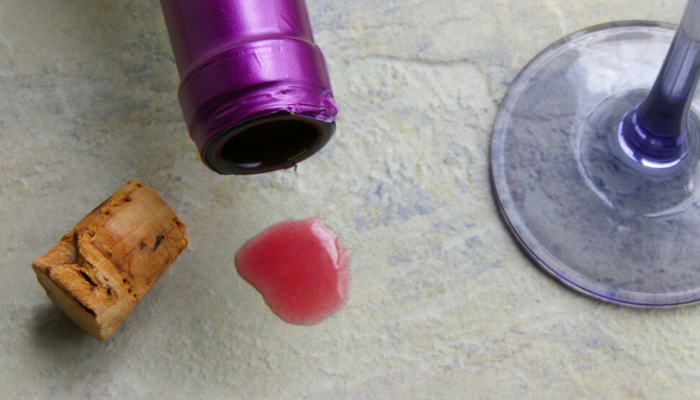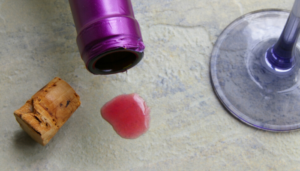The beauty, durability, and uniqueness of stone countertops make them an appealing choice for kitchen and bathroom countertops. Whether you choose from granite, marble, quartz, limestone, or concrete, it’s essential to learn how to clean off stains, so they stay pristine for years. In today’s blog, you’ll discover what’s best to use for cleaning your stone countertops.
Granite
For tough stains, including red wine or beet juice, use a commercially available stone poultice you can find on Amazon, or make your own. You can mix baking soda and hydrogen peroxide to form a thick paste resembling peanut butter. Spread the mixture about ¼ inch thick over the stain and cover with plastic wrap. To hold it in place, tape down the edges of the wrap. Keep the mixture on the stain for 24 hours. Then, remove the place wrap and allow the mixture to completely dry and then wipe away. You can repeat this process until the stain is gone. Note, once the stain is removed, the area will need to be resealed to prevent future staining.
Marble
To remove stains from marble, such as food stains or rust marks left by metals, mix baking soda and hydrogen peroxide and apply generously, then let dry about 24 hours before wiping it away. Many stains will gradually fade over time, but you can repeat the process as needed. Consider getting a stain removal specifically for marble. For grease stains, you can apply cornstarch or rubbing alcohol spray.
Quartz
The best thing about quartz is it rarely stains—yet, it’s still not stain proof, especially with fruit juices, tea, coffee, or wine. For these stains, use baking soda and water and rub it in with a soft cloth before they have a chance to settle in. You can remove nail polish or dried paint by using a putty knife. Permanent ink is a little tougher to remove. It’s best to get a product like Goo Gone® and rub it into the stain. You can also spray hairspray onto the marking, let it soak in, and gently pat it with a soft cloth.
Limestone
To remove stains from limestone, apply the same paste as you do with granite and marble. Excessive heat can burn or scorch the stone, which may result in the area needing to be resealed to prevent further damage. Keep in mind, limestone is softer and more porous than other stones, so it’s especially susceptible to staining from dark colors and acidic foods like coffee, black tea, or red wine.
Concrete
Stain removal from concrete is the hardest to tackle because the acid will dissolve the cement and leave carbonate deposits. These can’t be removed without buffing or grinding away the damage and then resealing the surface. It’s best to hire a professional if grinding or patching is required. Coffee or mustard, for instance, can be removed with chlorine bleach, by dipping a cotton ball or white paper towel in the bleach and applying directly to the stain. Weight it down with a heavy glass bowl and leave the bleach on the stain for about five to ten minutes. Rinse thoroughly with plain, cool water. For oil stains, you will need a solvent and something to absorb the oil. Baking soda and acetone work well. Follow the process as you do with granite.
Thinking of Upgrading Countertops?
Stone countertops are beautiful and durable, so if you’ve been thinking of upgrading, give us a call. Intermountain Stone and Marble Company has been in Utah since 1954, and we continue to provide the residents of Salt Lake City and surrounding areas with the highest quality stone products available. We have many options with which to choose and have quick turnaround times. Contact us today to learn more.


